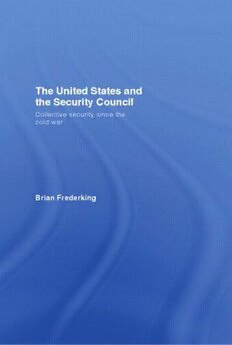Download The United States and the Security Council: Collective Security since the Cold War PDF Free - Full Version
Download The United States and the Security Council: Collective Security since the Cold War by Brian Frederking in PDF format completely FREE. No registration required, no payment needed. Get instant access to this valuable resource on PDFdrive.to!
About The United States and the Security Council: Collective Security since the Cold War
This book describes the rules governing international security decision-making and examines the different understandings of collective security in the post-Cold War world. The post-Cold War world has largely been a struggle over which rules govern global security. Discussions and decisions following the events of 9/11 have highlighted differences and disputes in the United Nations Security Council. Where Russia, China, and France prefer ‘procedural’ collective security, in which all enforcement attempts must be explicitly authorized by the Security Council, the US and Britain prefer ‘substantive’ collective security, in which particular countries can sometimes take it upon themselves to enforce the rules of the global community. Using a constructivist theory of global security to analyze a series of case studies on Iraq (1990-91); Somalia, Rwanda, and Haiti; Bosnia and Kosovo; Afghanistan and Iraq (2003), the author demonstrates how competing interpretations of collective security recur. Challenging the claim that 9/11 fundamentally changed world politics, Brian Frederking argues that the events exacerbated already existing tensions between the veto powers of the UN Security Council. The United States and the Security Council will be of interest to students and researchers of American foreign policy, security studies and international organizations.
Detailed Information
| Author: | Brian Frederking |
|---|---|
| Publication Year: | 2007 |
| ISBN: | 9780203944721 |
| Pages: | 206 |
| Language: | English |
| File Size: | 1.324 |
| Format: | |
| Price: | FREE |
Safe & Secure Download - No registration required
Why Choose PDFdrive for Your Free The United States and the Security Council: Collective Security since the Cold War Download?
- 100% Free: No hidden fees or subscriptions required for one book every day.
- No Registration: Immediate access is available without creating accounts for one book every day.
- Safe and Secure: Clean downloads without malware or viruses
- Multiple Formats: PDF, MOBI, Mpub,... optimized for all devices
- Educational Resource: Supporting knowledge sharing and learning
Frequently Asked Questions
Is it really free to download The United States and the Security Council: Collective Security since the Cold War PDF?
Yes, on https://PDFdrive.to you can download The United States and the Security Council: Collective Security since the Cold War by Brian Frederking completely free. We don't require any payment, subscription, or registration to access this PDF file. For 3 books every day.
How can I read The United States and the Security Council: Collective Security since the Cold War on my mobile device?
After downloading The United States and the Security Council: Collective Security since the Cold War PDF, you can open it with any PDF reader app on your phone or tablet. We recommend using Adobe Acrobat Reader, Apple Books, or Google Play Books for the best reading experience.
Is this the full version of The United States and the Security Council: Collective Security since the Cold War?
Yes, this is the complete PDF version of The United States and the Security Council: Collective Security since the Cold War by Brian Frederking. You will be able to read the entire content as in the printed version without missing any pages.
Is it legal to download The United States and the Security Council: Collective Security since the Cold War PDF for free?
https://PDFdrive.to provides links to free educational resources available online. We do not store any files on our servers. Please be aware of copyright laws in your country before downloading.
The materials shared are intended for research, educational, and personal use in accordance with fair use principles.

